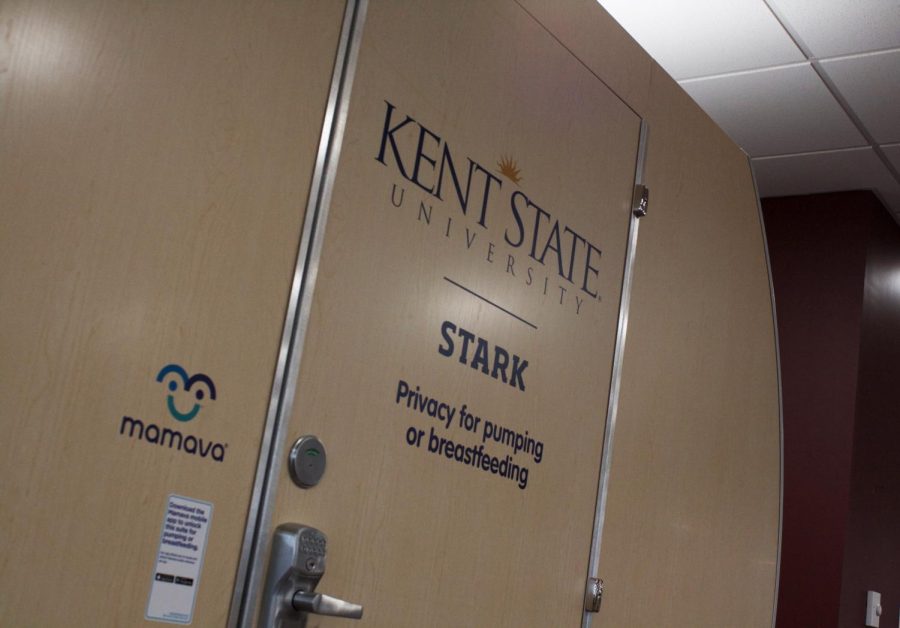Lactation Rooms: A right females should know about during Women’s History Month
Kent State Stark installed a lactation room after Dean Denise Seachrist realized that Stark needed a private location for moms to breastfeed without having to use bathrooms.
March 21, 2018
During her first year at Kent State Stark, Dean Denise Seachrist walked into the women’s restroom of the Stark conference center to hear a noise that sounded like a mouse.
It wasn’t a mouse, it was a baby.
Seachrist continued to listen to the sound and soon realized she was hearing an infant being nursed by its mother in a bathroom stall.
It was then that she knew the accommodations at Stark weren’t good enough, and something more needed to be done.
According to the Health Care and Education Reconciliation Act of 2010, employers are required to provide nursing mothers with reasonable break time to express breast milk for the first year following the birth of a child. A room must also be provided and shielded from view, free from intrusion by the public.
The provided room cannot be a bathroom.
Kent State’s eight-campus system offers lactation rooms for nursing mothers; nine rooms in various locations at the main campus and one room at each regional campus.
Each lactation room has a table and a chair provided, while some locations also have a small refrigerator to keep the milk fresh and cold.
Kent State Stark’s campus sets themselves apart from the rest of the university, as they are the only campus to provide a special lactation suite for nursing mothers called the Mamava.
The Mamava is a freestanding lactation suite that provides privacy, cleanliness, comfort and the basic necessities needed to breast pump or nurse an infant.
The 7’3″ suite has a multi-functional SmartLock with Bluetooth that syncs to Mamava’s mobile app to provide security and usage data. The suite is also equipped with an air-conditioning unit and a USB power outlet allowing mothers to charge their phone, power their breast pump and relax.
The Mamava has a fold down table made for holding a breast pump, and two benches to seat the nursing mother along with luggage, additional children or a stroller.
“I had a group of faculty come to me and said they are concerned because they know students in particular who have to decide which class they are going to miss because of their class schedule, and they had to have the lactation take place in between,” Seachrist said. “They would either have to miss a class or go home, and that was just another trigger that we needed to reach out.”
One of the concerned faculty members that came to Seachrist was Marie Gasper-Hulvat, an assistant professor of art history.
“When I had my daughter, I realized there weren’t a lot of services available to adults with babies on campus,” Gasper-Hulvat said. “I kind of made it a priority to figure out ways to make our campus more friendly for mothers who just had babies. It occurred to me that there weren’t changing tables. I had to ask for special accommodations when I had to go to meetings just to nurse or pump.”
The Mamava made its debut to the Stark campus in August 2017 as part of the library’s summer renovations. The idea of buying a Mamava suite came from Seachrist, as she was walking through an airport and came across a lactation suite. Prior to the Mamava, a lactation room was offered in the Stark library, but the room was shared with other organizations.
“I think particularly with the purchase and installation of this Mamava suite, it is a major step to making sure that the students, faculty and general public who come to us have a place where they feel it is safe, secure and clean,” Seachrist said.
The average age of a student at Kent Stark is 23. As a whole, there are over 500 employees and 5,000 students at the regional commuter-based campus.
“I think it is a bigger issue we need to address talking about regional campuses, that often times there is a larger commuter population and a larger group of non-traditional students,” said Director of the Women’s Center Cassandra Pegg-Kirby. “By non-traditional, it isn’t just age. It is also who may be balancing having a family and going to school. Sometimes we don’t take that into consideration when talking about climate.”
As March is Women’s History Month, the legal right for women to have a designated spot and break time to privately lactate and pump needs more awareness.
“I think recently we have heard the phrase that women’s rights are human rights,” Seachrist said. “I think it is really important we provide all the necessary services to lift us up. It is important to realize how much we value healthy families, healthy students, healthy workers and anything we can do to relieve the stress that just being a human is, it is our duty.”
Brynn Pennell is the regional campuses reporter. Contact her a [email protected].












